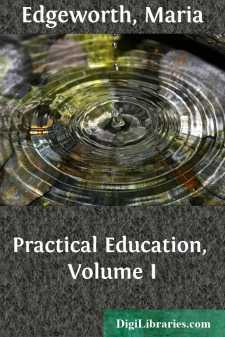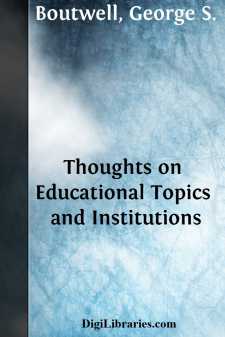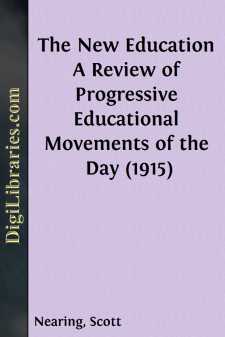Education
General Books
Sort by:
by:
Various
INTRODUCTION In times of anxiety and discontent, when discontent has engendered the belief that great and widespread economic and social changes are needed, there is a risk that men or States may act hastily, rushing to new schemes which seem promising chiefly because they are new, catching at expedients that have a superficial air of practicality, and forgetting the general theory upon which practical...
more...
IDEALS. A noble aim,Faithfully kept, is as a noble deed.Wordsworth. To few men does life bring a brighter day than that which places the crown upon their scholastic labors, and bids them go forth from the halls of the Alma Mater to the great world's battlefield. There is a freshness in these early triumphs which, like the bloom and fragrance of the flower, is quickly lost, never to be found again...
more...
by:
Maria Edgeworth
PREFACE. We shall not imitate the invidious example of some authors, who think it necessary to destroy the edifices of others, in order to clear the way for their own. We have no peculiar system to support, and, consequently, we have no temptation to attack the theories of others; and we have chosen the title of Practical Education, to point out that we rely entirely upon practice and experience. To...
more...
Words and terms have, to different minds, various significations; and we often find definitions changing in the progress of events. Bailey says learning is "skill in languages or sciences." To this, Walker adds what he calls "literature," and "skill in anything, good or bad." Dr. Webster enlarges the meaning of the word still more, and says, "Learning is the knowledge of...
more...
CHAPTER I INTRODUCTION—THE PRESENT UNREST IN EDUCATION The problems as to the end or ends at which our educational agencies should aim in the training and instruction of the children of the nation, and of the right methods of attaining these ends once they have been definitely and clearly recognised, are at the present day receiving greater and greater attention not only from professed...
more...
Gentlemen of the Canadian Club:—Your president has asked me to address you this afternoon in the English language. It is with great pleasure that I received this invitation and that I avail myself of the privilege of speaking to you in that language with regard to the very troublesome, somewhat distorted, and certainly much misrepresented school question in your sister province. First of all, I wish...
more...
THE POINT OF VIEW There is an endless, and perhaps worldwide, controversy as to what constitutes the "essentials" of education; and as to the steps to be taken in the teaching of these essentials. The safe plan for constructive workers appears to be to avoid personal educational philosophies and to read all the essentials of education within the needs and processes of the community itself....
more...
by:
Henry Faudel
"As the twelve tribes had many interests in common, and, in some respects, formed but one political body, the magistrates of all the tribes met in general assemblies to consult for the good of the nation." Jahn's History of the Hebrew Commonwealth. Whoever regards the state of our community in this country, must come to the conclusion, that we have arrived at an important period, when we...
more...
by:
Scott Nearing
PREFACE During 1910, 1911, and 1912, as a part of a general plan to write a book on education, I reread a great deal of the classical educational literature, and carefully perused most of the current material in magazine and book form. An interest aroused by undergraduate and graduate work in the department of pedagogy had been whetted by the revolutionary activity in every field of educational...
more...
INTRODUCTION The four essays on education which Herbert Spencer published in a single volume in 1861 were all written and separately published between 1854 and 1859. Their tone was aggressive and their proposals revolutionary; although all the doctrines—with one important exception—had already been vigorously preached by earlier writers on education, as Spencer himself was at pains to point out....
more...











